Microreview: Openings
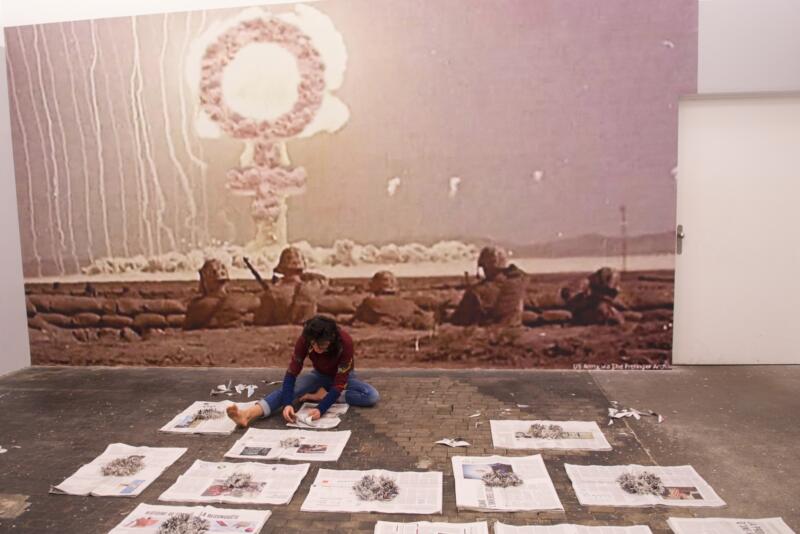
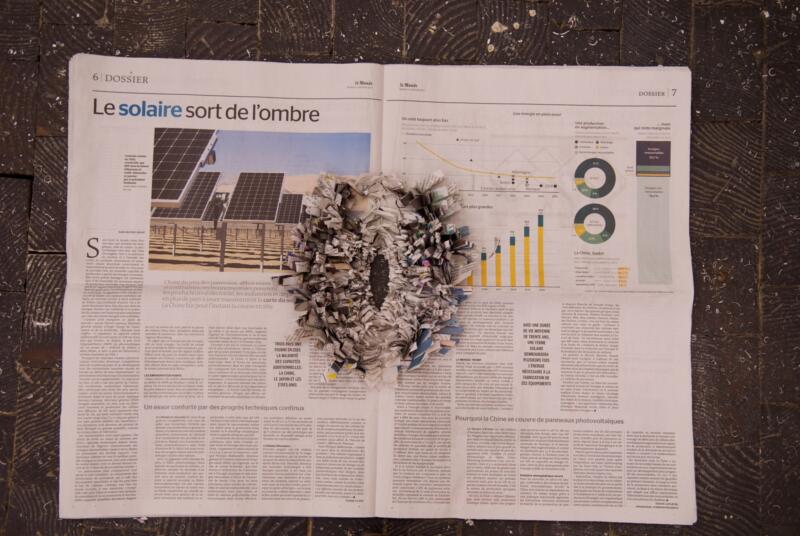
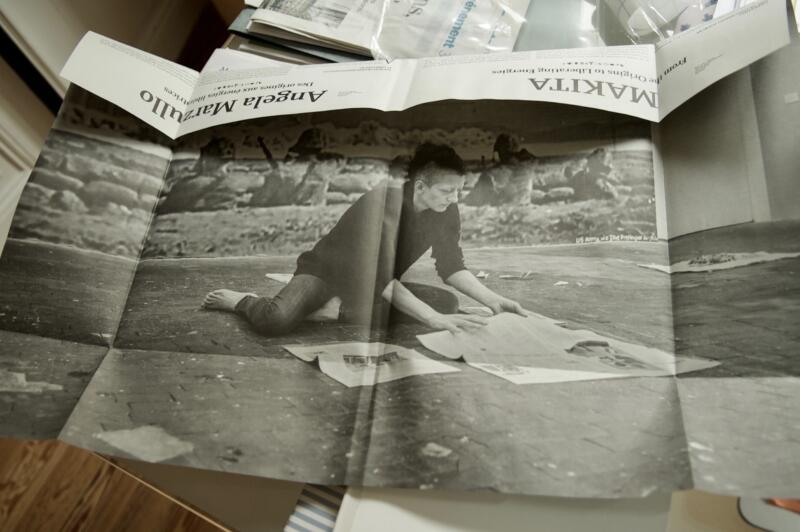
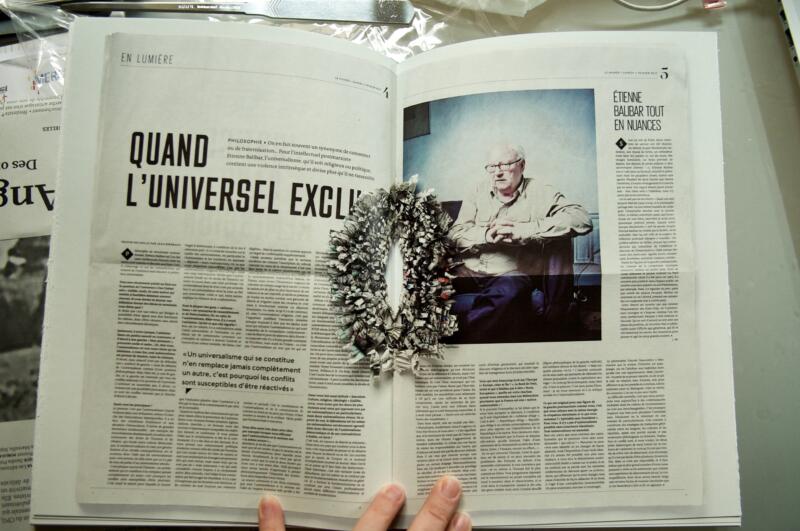
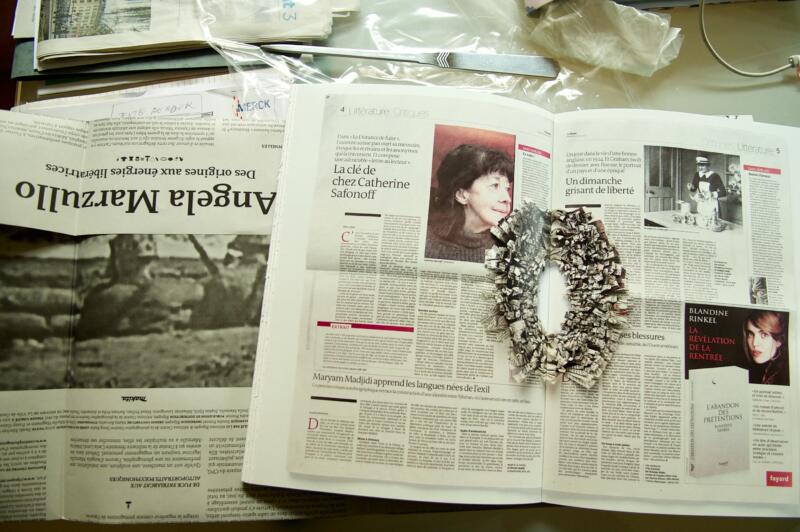
- Date
- 2021 January
- Subtitle
- Mabe Bethônico reviews L’Origine, artist book by Angela Marzullo, with text by Sarah Zürcher. Geneva, Published by Éditions Centre de la photographie Genève and Les Éditions Ripopée, 2019.
- Type
- microreview
- Author / Publisher
- Mabe Bethônico for NewsLibrary
- Author Info
Mabe Bethônico is an artist and reseacher who lives in Geneva, also working on curatorial and collective projects. She is presently a researcher at the École Superieure d’Art Annecy Alpes [ESAAA] and she teaches at HEAD – Genève. She was Associate Professor at Universidade Federal de Minas Gerais between 2001 and 2020. https://www.mabebethonico.online/
- Language
English
- Also published here
Newsletter No. 30
- Reviewed Publication
L’Origine, artist book by Angela Marzullo, with text by Sarah Zürcher. Geneva, Published by Éditions Centre de la photographie Genève and Les Éditions Ripopée, 2019. Limited edition, 250 ex.
During her exhibition entitled FEMINIST ENERGY CRISIS at the Centre de la photographie Genève in 2017, Angela Marzullo, a.k.a. Makita, performed daily at 11:00 for 28 days. Each day she laid the daily Le Monde on the floor in an unfolded stack, choosing a page to be visible on top. With scissors she carefully opened a hole in the crease of the open fold, cutting an orifice through all pages while pulling out the edges of the cut. The set was left where it lay, occupying a space on the floor as an imaginary grid that was gradually built throughout the performances; as a 28-day diary, in reference to a menstrual cycle.
Photographs of the papers are reproduced in double pages of the book with same title as the performance, L’Origine. It comes with a steel blade to open the folds, which are not trimmed. To access the content we must cut. We then see Le Monde, with news of world economic, social, political tensions, cultural news and advertisements, while a force from within the material manifests as a carefully crafted brutal tearing.
A text by curator and critic Sarah Zürcher envelops the cover, demanding a gesture of unfolding, the spreading out of paper, in order to read it. By not providing direct access, the publication invites an action within and outside. It requires a will to engage and it implies a sense of risk (damaging the edition or hurting oneself). We are confronted with the rupture of the original and a sort of violation, experimenting with issues approached by Marzullo in her work and related to women in the socio-political tissue. She makes many references to violence, always in an ironic way, criticizing male cultural constructs. In the case of L’Origine, for example, the violence pointed out by the blade is finally only a gentle proposition to allow access to the pages.
Publications
-
2026 February
Microreview: Piecing Pages – On working in fragments
Kate Briggs reviews Line Arngaard: Piecing Pages – On working in fragments, self-published by the author, 2025.
microreviewKate Briggs for NewsLibrary -
2026 January
Microreview: Radical Radio
Sam Richards reviews Lucinda Guy: Skylark.fm, 105.8 or 107.6 FM Dartmoor, Devon, England, since 2020.
microreviewSam Richards for NewsLibrary -
2025 November
Microreview: A Kind Reminder
Moosje M. Goosen reviews Staci Bu Shea: Dying Livingly, Sternberg / Solution Series 305, January 2025.
microreviewMoosje M. Goosen for NewsLibrary -
2025 October
Microreview: Archival Textures
Setareh Noorani reviews the publication series Archival Textures, founded in 2023 in Arnhem, the Netherlands, by Tabea Nixdorff.
microreviewSetareh Noorani for NewsLibrary -
2024 October
Microreview: Crear un común habitar
Daniel Godínez Nivón reviews Andrés González Berríos: Creating a common habitation: Reflections, exercises and texts for ecopoetic workshops. The Eternal Return Home: Mexico City, 2019 (Spanish)
microreviewDaniel Godínez Nivón for NewsLibrary -
2024 September
Microreview: A Colourful Flock in Expansion
Gabriel Gee reviews the library at La Dépendance artist residency in the Swiss Jura outside of St-Imier. Initiated and run by the artist Jan Van Oordt since 2018.
microreviewGabriel N. Gee for NewsLibrary -
2024 August
Microreview: Nourishing the Unborn
E. Onur Ceritoglu reviews Kadija de Paula: Milk it: pasteurized human milk made to nourish the future of those who have not yet digested the insult of being born. Silkscreen on glass bottles, instruction sheet, 2022.
microreviewE. Onur Ceritoglu for NewsLibrary -
2024 May
Microreview: TraumaZone: How to Approach an Archive
Julia Heurling reviews Adam Curtis: Russia 1985-1999: TraumaZone - What It Felt Like to Live Through The Collapse of Communism and Democracy. 7 Videos (ca. 1 hr each).
microreviewJulia Heurling for NewsLibrary -
2024 April
Microreview: The Poetic Power of Social Labour
Mahroo Movahedi reviews Liza Lou, Breathing Lesson, Acrylic on rigid mounting canvas, nails, beaded cloths. 2023.
microreviewMahroo Movahedi for NewsLibrary -
2024 March
Microreview: I don't like the rules, I like this game.
Francisco González Castro reviews Alys Longley: Smudge Skittle: A little inventory of resources entangling creative practice research and writing. University of Auckland, 2018.
microreviewFrancisco González Castro for NewsLibrary -
2024 January
Microreview: Public Secrets – Knowledge under Censorship
Simone Etter reviews Zoran Naskovski – Public Secrets, retrospective at the Museum of Contemporary Art Belgrad, Serbia (19.10.23 – 26.02.24)
microreviewSimone Etter for NewsLibrary -
2023 November
Microreview: The Big Overview – An Analogue Hinge for Digital Content
Siri Peyer reviews Inventory and Hinge. Entangled Fields of Research in the Arts. Institute for Contemporary Art Research 2001–2022, Christoph Schenker (Ed.), Diaphanes 2022.
microreviewSiri Peyer for NewsLibrary -
2023 September
Microreview: Of celluloid, plants, and archival monsters – Leandro Listorti's HERBARIA
Andrea Bordoli reviews Leandro Listorti, Herbaria, Argentina/Germany, 2022, 83 min, Spanish/German
microreviewAndrea Bordoli for NewsLibrary -
2023 July
Microreview: Dream Portal, Time Machine
Yin Yin Wong reviews Jay Tan, 'Under the Table' and 'Cave', mixed media installation, Dolf Henkes Prize exhibition, TENT Rotterdam, 05.06.2021 – 22.08.2021
microreviewYin Yin Wong for NewsLibrary -
2023 June
Microreview: To Make the Road by Walking
Daniel Frota de Abreu reviews Vijai Maia Patchineelam, The artist job description, for the employment of the artist as an artist, inside the art institution, published by Track Report (Antwerp), in collaboration with OAZA (Zagreb) and a.pass (Brussels), 2022.
microreviewDaniel Frota de Abreu for NewsLibrary -
2023 May
Microreview: The Paralyzing Present of Collapse
Lamia Abukhadra reviews Walid Sadek, Paintings 2020 – 2022, Beirut, September 2022.
microreviewLamia Abukhadra for NewsLibrary -
2023 March
Microreview: Love as an aesthetic-collective practice
Fatma Kargin reviews Love? Eine Werkstatt, 02.12. – 10.04.2023. Rautenstrauch-Joest-Museum, Ethnological Museum of Cologne.
microreviewFatma Kargin for NewsLibrary -
2023 February
Microreview: Memory and Stasis in Abkhazia
Asida Butba reviews Sam Jury & Anton Ochirov, This You Must Remember, mixed media exhibition, DEPO Istanbul, 8 November 2022–9 January 2023.
microreviewAsida Butba for NewsLibrary -
2022 December
Microreview: Staging Archives and Revealing Legacies
Julie Marmet reviews Camille Kaiser, Photographs by the sea, 1962 (Swiss Art Awards 2022, Basel) and Off-camera (Kunsthalle St.-Gallen 27.08-06.11.2022).
microreviewJulie Marmet for NewsLibrary -
2022 October
Microreview: Segopotso sa Gomora: A Form(less) Archive
Nyakallo Maleke reviews Refiloe Namise, Segopotso sa Gomora, mixed media installation and performance, The Point of Order & Johannesburg, 31 March–17 April 2022.
microreviewNyakallo Maleke for NewsLibrary -
2022 September
Microreview: Rigorous witnesses – rereading Herta Müller’s The Hunger Angel through the lens of poetic transcription
Regina Dürig reviews Herta Müller, The Hunger Angel (orig.: Atemschaukel), Berlin: Hanser, 2009.
microreviewRegina Dürig for NewsLibrary -
2022 August
Microreview: Artiste? Et sinon tu fais quoi?
Nihan Somay reviews Artiste? Et sinon tu fais quoi? (2016-ongoing), a project initiated by Louise Mestrallet and Cristián Valenzuela.
microreviewNihan Somay for NewsLibrary -
2022 June
Microreview: The Waves
Sabine Popp reviews Espen Sommer Eide feat. Martin Taxt and Mari Kvien Brunvoll, The Waves, Christinegaard Hovedgaard, Bergen, Norway, Borealis festival for experimental music, 16.3.-20.3.2022.
microreviewSabine Popp for NewsLibrary -
2022 May
Microreview: Pilots Forever?
Rachel Mader reviews Creator Doctus (CrD): EQ Arts. A framework of good practices for 3rd cycle doctoral awards in the creative and performing arts sector, and The Creator Doctus Constellation. Exploring a new model for a doctorate in the arts , 2021.
microreviewRachel Mader for NewsLibrary -
2022 April
Microreview: Call for Artistic Research Lobbying
Siri Peyer reviews Creator Doctus (CrD) – a position paper, December 2021.
microreviewSiri Peyer for NewsLibrary -
2022 March
SARN Annual Report 2021
SARN annual Report 2021
ReportSARN -
2022 February
Microreview: Inconsistency of Appearance
Nicole Ottiger reviews Christian Gonzenbach, La plonge (The Plunge), 2021, exhibition at Galerie Heinzer Reszler, Lausanne, 11.12.2021 to 6.02.2022
microreviewNicole Ottiger for NewsLibrary -
2021 December
Microreview: Dream Room (moving beyond the flat frontality of online meetings)
Nienke Terpsma reviews Katie Ward and Paula Walta (choreographers-dancers): Dream Room, 4 performances of approximately 1 hour, Centre d'artistes AXENÉO7 in Gatineau/Québec, and simultaneously in Arnhem and online, October 2021.
microreviewNienke Terpsma for NewsLibrary -
2021 November
Microreview: Camille´s Encounter with another Camille (or why we need a care revolution) copy
Valeria Schwarz reviews Donna J. Haraway's “The Camille Stories. Children of Compost”, 2016 and Valeria Schwarz' Encounter with Another Camille, 2020.
microreviewValeria Schwarz for NewsLibrary -
2021 October
Microreview: Historical materials unfit for museumization
Mohamed Abdelkarim reviews Noor Abuarafeh, 'The Earth Doesn’t Tell its Secrets' — His father once said, paperback: 255 pages, Sharjah Art Foundation, 2017
microreviewMohamed Abdelkarim for NewsLibrary -
2021 September
Microreview: Language as a space for performance activation
Noor Abuarafeh reviews Mohamed Abdelkarim, Let the Sea Eat ME: To Perform a Ferry, Esmat—Publishing List and MACACO PRESS, 2021.
microreviewNoor Abuarafeh for NewsLibrary -
2021 August
Microreview: The streets are ours!
Leslie Fernández Barrera reviews multiple collaborations from the video essay The streets are ours. October 2019 - October 2020.
microreviewLeslie Fernández Barrera for NewsLibrary -
2021 July
Microreview: Cordones Des-industriales (a fragment)
Eduardo Cruces reviews an open collection of words written by more than sixty researchers and collectives from various disciplines, mostly from Latin America or Spanish speakers (open to other languages), who share the grammar that makes up their research as an act of solidarity, July 2021-ongoing.
microreviewEduardo Cruces for NewsLibrary -
2021 June
Microreview: Dialectic Diatribes on the New European Bauhaus
(Statler & Waldorf for) Anke Gruendel and Jamie Allen review the New European Bauhaus project in 3 parts
microreviewAnke Gruendel and Jamie Allen for NewsLibrary -
2021 May
Microreview: Continuous search for understanding
Ásthildur Jonsdóttir reviews Halla Birgisdóttir: Did I notice it then, or did I notice it afterwards?, 2013-present
microreviewÁsthildur Jonsdóttir for NewsLibrary -
2021 April
Microreview: Beating the Bounds
Robert Hamelijnck reviews Grayson Perry: Beating the Bounds, in Playing to the Gallery, Reith Lecture, Liverpool, 2013.
microreviewRobert Hamelijnck for NewsLibrary -
2021 April
SARN Annual Report 2020
SARN annual Report 2020
ReportSARN -
2021 February
Microreview: PlanteSorcières – External and internal uses of knowledge copy
Petra Köhle reviews Caterina Giansiracusa and Andrea Herrera. PlanteSorcières, a multidisciplinary project that started in 2018 (ongoing) at various locations and resulting in diverse publication forms.
microreviewPetra Köhle for NewsLibrary -
2021 January
Microreview: Openings
Mabe Bethônico reviews L’Origine, artist book by Angela Marzullo, with text by Sarah Zürcher. Geneva, Published by Éditions Centre de la photographie Genève and Les Éditions Ripopée, 2019.
microreviewMabe Bethônico for NewsLibrary -
2020 December
Microreview: Exploring biographies and geographies of breath/lessness
Kadiatou Diallo reviews Stacy Hardy, Laila Soliman, Nancy Mounir, Neo Muyanga’s documentary performance Museum of Lungs, 2018/2019
microreviewKadiatou Diallo for NewsLibrary -
2020 November
Microreview: Books as Spaces for Encounters
Anne-Laure Franchette reviews quotation mark quotation mark #3 Becky Beasley in conversation with Claire Scanlon, NERO Editions, 2019
microreviewAnne-Laure Franchette for NewsLibrary -
2020 October
Microreview: Implementing Bricolage
Denise Ziegler Reviews Tikkaoja, Oona. Everyday Anomaly Archive, 2010-2020
microreviewDenise Ziegler for NewsLibrary -
2020 September
Microreview: To Dismantle
Tine Melzer reviews Frauchiger, Marco. How to dismantle a bomb, 2020.
microreviewTine Melzer for NewsLibrary -
2020 August
Microreview: Seeing Anew
Gabriella Disler reviews Tuerlinckx, Joëlle. Lexicon & WOR(L)(D)(K) in PROGRESS ? (2012)
microreviewGabriella Disler for NewsLibrary -
2020 July
Microreview: Staging Polyphony
Erin Mallon reviews Robinson, Anne. Through the air with the greatest of ease: Phonogenie (Seismograf audio paper, 2016)
microreviewErin Mallon for NewsLibrary -
2020 June
Microreview: Being Precise
Markus Schwander reviews Schuck, Nicole. Valued Animals - From Wildlife Topographies to the Ecosystem Services of Marine and Alpine Fauna, (Hatje Cantz 2010 – 2020)
microreviewMarkus Schwander for NewsLibrary -
2017 October
Phd-Making Is My Art Practice copy
Notes and insights on the art PhD-experience in Switzerland
SARN bookletJulie Harboe, Federica Martini for SARN -
2017 May
All We Need is (Art) Research?
Status and Perspectives on Artistic Reserach at Swiss Universities of the Arts
SARN bookletFlavia Caviezel & Priska Gisler for SARN -
2015 January
SARN Notebook : 87 questions on Artistic Research
Published by SARN in collaboration with ELIA in the frame of conference 'Economies of Aesthetics' (Basel 2015)
SARN bookletMarkus Schwander and Flavia Caviezel for SARN, in collaboration with ELIA -
2014 June
Publishing Artistic Research
Collection insights on publishing in the field based on Sarn's series of workshops from 2011-2014
SARN bookletBarnaby Drabble & Federica Martini for SARN -
2014 June
Open Source / Sharing Knowledge in Artistic Research
Based on the proceedings of the SARN workshop co-organized by HEAD and ECAV in Geneva in March, 2013
SARN bookletBarnaby Drabble & Federica Martini for SARN -
2014 June
Artistic Research : The Language Issue
Based on the SARN workshop of the same name held in 2013.
SARN bookletLucie Kolb, Ronny Hardliz, Franz Krähenbühl, Julie Harboe, Christoph Lang, Andrea Portmann for SARN
